Quizlet Biblical and Theological Foundations for Family Ministry
Missions and Church Planting:
Advanced Program of Report
Preview: Explore church building planting with Dr. Sisk
- Sympathize the history of missions throughout Church history and its touch on missionary practice.
- Learn how to self-gear up for a mission and develop effective strategies to support a mission.
- Analyze approaches to contextualization, business organization every bit mission, team dynamics, etc.
- Learn the foundations of missional church building planting approaches.
- Sympathize the beliefs and practices of major world religions and how the gospel fulfills their "orienting cadre."
- Explain the significance of key Scriptures to sympathize apologetics and worldview.
- Articulate the mission of the Church and explicate how Christians provide a witness by their lives and actions.
- Define the Church's mission and explain how the Church has approached the chore of accomplishing that mission during diverse eras of Church building history.
- Understand the biblical foundations of evangelism and discipleship.
- Compare and contrast major leadership styles.
- Immerses the student in the theory and exercise of evangelism within missions and church planting, giving them the tools to live out the Groovy Commission at home and internationally
- Equips the student with tools for research in this field
- Empowers the student with seminary-level training in missions and church planting, leading toward further study and research
- Enables leaders in the Church and Christian academy to learn the missional leadership styles and structures advisable to a Church building planting effort within varied cultures and communities
- Equips the student for discipleship cantankerous-culturally
- Provides a framework for the educatee to deliver, train young Christians, and mentor believers toward maturity to fulfill their ministry calling
The advanced program uses the foundational and intermediate programs every bit a base of operations and then digs even deeper into the program content.
Courses - Foundational
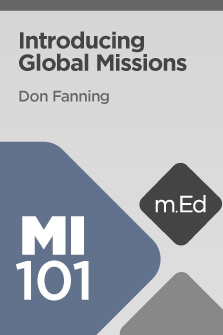
MI101 Introducing Global Missions
Published: 2014
Video Hours: vii
Introducing Global Missions (MI101) introduces students to the reality of the rapidly changing sociopolitical world of the concluding lxx years. The course explores the development of a theology of mission, reviews a history of missions from the first century to the present, and assesses possible directions for global missions in the future based on current trends. It too introduces practical matters of preparing for missions, developing a strategy for a proposed mission, agreement cross-cultural considerations, fund-raising, and interacting with other religions of the world.

Professor:
Dr. Don Fanning
PhD, Southern Theological Seminary; DMin, Upper-case letter Bible Seminary; MDiv, Capital Bible Seminary; MA, Pensacola Christian College
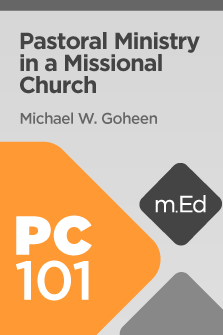
PC101 Pastoral Ministry building in a Missional Church
Published: 2014
Video Hours: seven
Pastoral Ministry in a Missional Church (PC101) examines the identity of the Church according to the Bible and so considers the implications of this identity for the Church building'due south mission. Starting time with the concept of a missional community in the OT, the course traces God's work among his people into the NT community of believers and offers perspective on how the ministries of today's church tin can be structured to fulfill God'south calling.

Professor:
Dr. Michael Westward. Goheen
PhD, University of Utrecht; MA, Westminster Theological Seminary
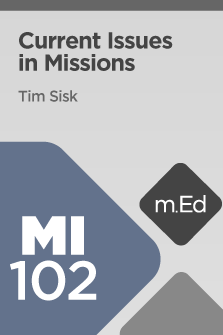
MI102 Electric current Issues in Missions
Published: 2014
Video Hours: half dozen
Electric current Issues in Missions (MI102) discusses the changing world situation since the kickoff of the modern missions motion in the mid-nineteenth century and introduces new mission opportunities and approaches these changes have created. The class explores the touch on and implications of globalization and the shift of the "Christian center" from Europe and European-derivative cultures to the southern hemisphere. The course likewise introduces the contemporary debates regarding appropriate contextualization and the human relationship between evangelism, humanitarian relief, and issues of justice.

Professor:
Dr. Timothy Sisk
DMin, Fuller Theological Seminary; ThM, Dallas Theological Seminary
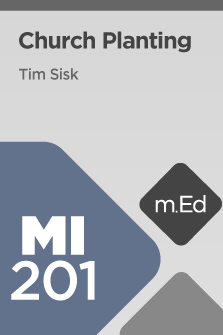
MI201 Church Planting
Published: 2014
Video Hours: 6
Church building Planting (MI201) introduces students to the activity of church planting every bit a component of participation in the mission of the Church. The form establishes the biblical foundation for church building planting equally a work of the Spirit to call and empower believers to participate in the Great Commission in this specific, missional way. It looks at the methods and models used in biblical examples of church planting and examines church planting throughout the history of the Church.

Professor:
Dr. Timothy Sisk
DMin, Fuller Theological Seminary; ThM, Dallas Theological Seminary
Courses - Intermediate
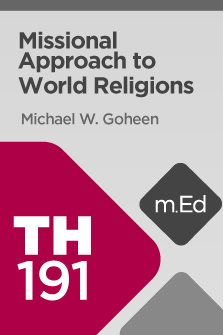
TH191 Missional Approach to World Religions
Published: 2014
Video Hours: eight
Missional Approach to World Religions (TH191) provides a framework for understanding and analyzing earth religions. The course discusses the theology of religions and gives an overview of three major religions: Hinduism, Buddhism, and Islam. The discussion of these religions pays special attending to the center or core behind their beliefs and practices and discusses how Christians might begin to dialogue with people of these faiths.

Professor:
Dr. Michael West. Goheen
PhD, University of Utrecht; MA, Westminster Theological Seminary
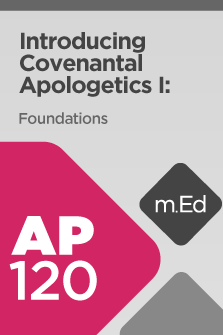
AP120 Introducing Covenantal Apologetics I
Published: 2014
Video Hours: 10
Introducing Covenantal Apologetics I (AP120) lays the biblical and theological foundations for covenantal apologetics. Information technology begins by tracing God's defense of himself through the One-time and New Testaments, then it identifies the significance of this defense for our own apologetic. It continues with an examination of the theological ground for apologetics equally axiomatic in the doctrines of Scripture, God, man, and salvation.

Professor:
Dr. K. Scott Oliphint
PhD, Westminster Theological Seminary; ThM, Westminster Theological Seminary; MAR, Westminster Theological Seminary
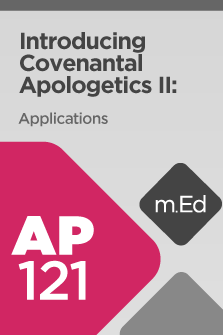
AP121 Introducing Covenantal Apologetics II
Published: 2014
Video Hours: five
Introducing Covenantal Apologetics 2 (AP121) continues to build on the biblical and theological foundations for covenantal apologetics laid in AP120. This course begins by discussing God's common grace and its effect on our view of divine activity in the world. It continues with an exam of worldview, including the history of worldview scholarship and how a worldview helps Christians make sense of the world. The course concludes with a comparing of covenantal apologetics with traditional apologetics, specially in their approaches to the trouble of evil.

Professor:
Dr. K. Scott Oliphint
PhD, Westminster Theological Seminary; ThM, Westminster Theological Seminary; MAR, Westminster Theological Seminary
Courses - Advanced
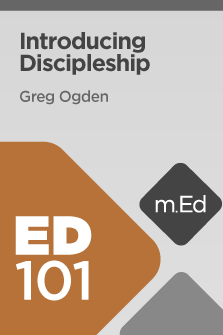
ED101 Introducing Discipleship
Published: 2014
Video Hours: 8
Introducing Discipleship (ED101) examines what it ways to be a disciple and how disciple-making can occur in the church context. In 3 major sections, the course considers the Church's missional mandate and some cadre theological challenges to conveying information technology out, biblical models of disciple-making as seen in the ministries of Jesus and Paul, and the application of disciple-making models in the context of the local church.

Professor:
Dr. Greg Ogden
DMin, Fuller Theological Seminary
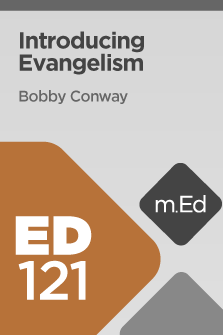
ED121 Introducing Evangelism
Published: 2014
Video Hours: v
Introducing Evangelism (ED121) examines the biblical concept of evangelism and considers the believer'southward motivation to share the gospel. Information technology offers a five-bespeak strategy for evangelism that includes prayer, apologetics, relationship-edifice, storytelling, and the Christian community. The grade concludes with the answers to seven questions that surround the evangelistic attempt.

Professor:
Dr. Bobby Conway
DMin, Southern Evangelical Seminary; ThM Dallas Theological Seminary
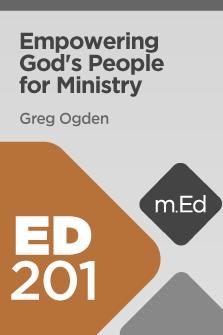
ED201 Empowering God's People for Ministry
Published: 2014
Video Hours: 7
Empowering God's People for Ministry (ED201) considers the concept of the "horizontal priesthood" of believers and their role every bit ministers to ane another in the trunk of Christ. The grade begins past because what it means for the Church to exist a living organism and how historic approaches to church leadership have failed to empower believers to government minister. It then evaluates various models of ministry and proposes a way forrad that involves God'due south telephone call to all believers, the essential ingredients for life transformation, and the office of all believers to exist ministers.

Professor:
Dr. Greg Ogden
DMin, Fuller Theological Seminary
Included Resources
Your program of report includes the option of resource beneath, which are all used within the courses to aggrandize upon and develop the concepts beingness taught.
Mobile Ed Is Powered by Logos Bible Software
Mobile Ed courses are tightly integrated with Logos base packages. The larger your base package, the more recommended course readings will be unlocked. To take admission to all of the digital tools and research methods presented in each grade, we recommend Logos Gold.
Syllabus & Learning Outcomes
Introduction
Abound in living out the Dandy Commission, from your home church to international mission fields! With this track, you will study under seasoned church planters and missionaries to prepare both you and your church building to reply to a changing missional landscape. Whether yous are preparing to help equip your local church to develop a missional mindset, prepare for short term missions, or study toward a lifetime of planting churches among unreached people groups, this track will equip you with a foundation of biblical, historical, theological and applied knowledge.
Purpose
The Missions & Church Planting track is designed to provide a foundation for missional studies for both professional and lay ministry. The courses will ready the student toward living out the Slap-up Commission in home and international mission fields.
Specific Outcomes
Knowledge-Based Foundational Outcomes
- Describe the changing world of the past lxx years and identify how these changes have impacted and influenced the current practices of missionaries and mission agencies
- Recount the overarching shape of missions throughout Church building history
- Outline guidelines for self-grooming for a mission, cultural grooming for missions, and establishing effective strategies for developing and supporting a mission
- Describe missional approaches to encountering the religions of the world
- Clarify the trends and issues in contemporary global missions and give thought to where global missions are headed
- Explain the concept of a "missional hermeneutic" and its human relationship to the gospel
- Summarize how the Sometime Testament people of God shape our understanding of the Church
- Discuss the significance of Jesus' life, death, resurrection, and ascent on the identity of the Church
- Depict the development of the New Attestation Church building with respect to its mission
- Discuss how pastors can provide for the nurture of church members through church ministries
- Describe how the system of a church can support its missional purpose
- Identify major changes in global Christianity over the by 150 years and describe how these changes have impacted assumptions regarding missions and approaches to missions by Western missionaries and mission agencies
- Talk over the importance of theologies that have emerged from the global Southward and from other not-Western cultures
- Summarize missions tactics that hamper the independence of ethnic churches
- Identify examples of subtle residuum attitudes of paternalism, racism, and colonialism that may linger in Western missionaries and mission organizations
- Describe the opportunities presented past business organisation equally mission (BAM)
- Evaluate the resource consumption and overall effectiveness of short-term missions
- Talk over the impact of spiritual conflict on the effectiveness of missionaries and draw diverse approaches to appointment in the conflict
- Place theological matters that are currently being debated equally the world moves toward cultural and religious pluralism
- Analyze approaches to contextualization and consider the matter of potential syncretism
- Nowadays the leading positions in the debate over the roles of evangelism and social justice in missions
- Support and defend the concept of church planting from biblical, theological, and practical viewpoints
- Recognize Church planting as an outgrowth of Jesus' annunciation that he will build his Church
- Relate to church planting as participation among "God's fellow workers" in the proclamation and demonstration of the kingdom of God
- Summarize the skills and grapheme attributes needed past successful church planters
- Analyze the positives and negatives of church building planting using a squad arroyo
- Develop an appropriate ecclesiology for the planned church plant
- Ascertain the characteristics of good for you churches
- Explain the importance of vision to church planting and draw how core values and cultural style and expectations may dictate how the vision volition be implemented
- Discuss central bug that must be addressed in the church planting effort
- Choose leadership styles and structures appropriate to a church building planting try within a particular culture and customs
Knowledge-Based Intermediate Outcomes
- Describe the challenge religious plurality presents to the church building
- Explain the terms "missionary run across," "missionary approach," and "subversive fulfillment"
- Communicate how the gospel permeates all aspects of life
- Depict the importance of having a theology of religions
- Discuss the behavior and practices of Hinduism, Buddhism, and Islam
- Identify the "orienting core" of these religions and describe how the gospel fulfills it
- Clear the mission of the Church building and explicate how Christians provide a witness past their lives and actions
- Summarize how the Bible portrays God's revelation equally a defence force of himself
- Discuss the role of covenant in apologetics
- Explain the significance of 1 Pet 3:15 and 2 Cor x:1–5 for understanding apologetics
- Depict the roles of exegesis, theology, and philosophy with respect to apologetics
- Summarize the Reformed doctrines of Scripture, God, man, and conservancy
- Define "common grace" and discuss its three central elements
- Summarize the development of scholarship on worldview
- Discuss the speaker'due south definition of "worldview"
- Compare and contrast covenantal apologetics and traditional apologetics
- Explicate how diverse approaches to apologetics deal with the problem of evil
Knowledge-Based Advanced Outcomes
- Ascertain the Church building'due south mission and explain how the Church has approached the job of accomplishing that mission during diverse eras of Church history
- Hash out the theological challenges of accomplishing the mission of the Church building
- Describe the models of discipleship evident in the lives of Jesus and Paul
- Explain how these models tin can exist applied in the context of the local church
- Explain the urgency of evangelism
- Discuss the biblical foundations of evangelism
- Identify the v elements of the Attain acrostic and hash out their importance
- Summarize the responses to significant questions that surround evangelism
- Identify the paradigms that have characterized the Church in history and discuss the significance of the present paradigm
- Compare and dissimilarity the ideas of the Church as an institution and the Church building as an organism
- Describe the promise of the Reformation with respect to believers as ministers and explain why this promise has not been fulfilled
- Compare and dissimilarity the traditional top-down way of church leadership and the lesser-upwardly approach
- Talk over the three kinds of calls and explicate their significance to the life of the church
- Summarize the value of small groups to church building ministry
Skill-Based Foundational Outcomes Using Logos Bible Software
- Notice translation obstacles in the UBS Handbooks
- Use the Bible Facts Tool and Topic Guide on Samaria
- Detect maps that illustrate the spread of Christianity
- Use the Topic search to study the feast of Pentecost
- Beginning a study on "synagogue" with the Bible Facts Tool
- Study early Christian persecution and perform other studies in early Church history
- Inquiry the missionary and martyrdom traditions about the apostles
- Use the Timeline Tool to find relevant historical occurrences
- Perform a heading text search on William Carey
- Complete a Basic search for articles on the Second Vatican Quango
- Use BDAG to study the Greek of the New Testament and other aboriginal literature
- Study the Greek words backside the English "good" and "evil'
- Examine Jesus' use of the term "gospel" using the Words of Christ search role
- Use the Copy Bible Verses function to view Bible text only
- Trace the Old Testament metaphorical use of "sheep" in the Theological Lexicon of the New Testament
- Utilize the Logos Deluxe Map Set for a chronological, birds-middle view of the persecution and expansion of the early Church building
- Study the ministry of Barnabas using the Bible Facts Tool
- Research the regal counter-narrative in the vocal of Rev 4:xi
- Find biblical benedictions for employ in church services
- Thematically organize the New Attestation apply of allēlōn using the passage list document
- Examine scriptural themes of prayer using the topical alphabetize from An Exposition on Prayer in the Bible
- Begin a study on early Church leadership using A History of the Jewish People in the Time of Jesus Christ
- Preview global theology resources
- Search for articles on missional Scripture reading
- Complete a Basic search on Protestant clergy and aity divide
- Start a study on "hell" with the Bible Word Written report Guide
- Conduct a Morph search on Jesus' use of "Gehenna"
- Use the Bible Sense Lexicon to perform a study on demons
- Research Hebrew contextualization in the Lexham Bible Dictionary
- Create a Faithlife group for missionaries
- Search Themelios for "insider movement"
- Sort unlike uses of ekklesia with Louw-Nida numbers
- Find metaphors for the Church building using the Bible Sense Lexicon
- Research the dating of Acts in commentary introductions
- Find references to the Holy Spirit in Acts
- Utilize the Prayer List feature for church planting
- Perform a search on biblical conflict resolution
- Report Acts xvi in the Faithlife Study Bible
Skill-Based Intermediate Outcomes Using Logos Bible Software
- Find charts that correspond world religions
- Use the resources Christ and Creation to investigate the global implications of the gospel
- Create a collection of world religion and apologetics resource
- Itemize data and resources on general revelation
- Complete an exegetical discussion study on Rom 1:xviii–32
- Use the Apologetics Study Bible
- Use the Baker Encyclopedia of Christian Apologetics
- Add reference websites to your Logos shortcuts bar
- Use apologetics resource not found in the base package
- Employ timelines to constitute historical context
- Perform a morphology search for kakoō
- Observe Quondam Attestation allusions with the Passage Guide and Explorer Tool
- Research exegetical problems in 1 Pet 3:fifteen
- Enquiry the idea that Paul'south opponents in ii Corinthians were Sophists
- Search for the ability of God in the New Testament
- Explore the Cosmic and Protestant canons
- Study "jealousy" with the Bible Word Study Guide
- Examine names for God in Psa 50:1
- Study the Trinity with the Sermon Starter Guide
- Use Calvin'south Institutes in Logos
- Survey James Orr's impact on apologetics
- Create a clipboard file to tape quotes past Calvin on apologetics
- Study logic in apologetics past creating and searching a custom drove
- Contrast two Hebrew words for "knowledge" in Genesis
Skill-Based Avant-garde Outcomes Using Logos Bible Software
- Use Proximity searching to enquiry the mission of the Church
- Use morphology features to find Greek constructions
- Use visual filters to marker exact participles
- Search the writings of the Church fathers for theological ideas
- Utilise the Sermon Starter Guide to find helpful illustrations
- Apply root searching and Greek lexicons to study words used only one time
- Search the words of Christ for commands to disciples
- Create groups in Faithlife to share prayer requests
- Employ Faithlife groups to share reading plans and customs notes
- Employ notes to exercise inductive Bible study
- Employ the Baker'south Dictionary of Practical Theology to investigate the development of church regime forms
- Use the Bible Sense Lexicon to discover the two meanings for the term "body" in one Cor 12
- Locate all the places where the term "head" refers to Jesus
- Locate a comparing chart that displays the various spiritual gifts in order of appearance
- Detect the common Greek root behind key words in Acts half dozen:ane–4
- Use the Bible Facts Tool to deport a character written report on Jethro
- Run a Bible search to compare the New Testament apply of "elders" vs. "elder"
- Run a Clause search to find places where God is the discipline of a clause, performing the action of calling
- Use Faithlife to create and share prayer requests
- Apply Logos to create and share a custom reading programme with your Faithlife group
nehringbutiefull1994.blogspot.com
Source: https://www.logos.com/mobile-ed/programs-of-study/missions-and-church-planting/advanced
0 Response to "Quizlet Biblical and Theological Foundations for Family Ministry"
ارسال یک نظر